With 300mg of caffeine, Bang is definitely one of the strongest energy drinks you can find and it’s certain to give you the energy boost you crave without all those sugary calories getting in the way.
Although it’s generally considered to be a healthier choice as far as energy drinks go, due to its lack of sugar, but it’s hard to know for sure if Bang is truly healthy, which begs the question: is Bang energy bad for you?
Cutting the chase, as long as you’re relatively healthy and know how to control your caffeine intake, neither your health or your diet should be negatively affected by having a can of Bang every now and then.
For a more detailed answer, read on to find out all you need to know about Bang Energy, from its nutrition facts to its caffeine content and exactly how it might affect your overall health.
Contents
Bang Energy Nutrition Facts
Nutritional facts of Bang Energy, from the back of the can.
| Typical Values | Bang (16 fl.oz) |
| Energy | 0 calories |
| Protein | 0g |
| Fat (Of which Saturated) | 0g (0g) |
| Carbohydrate (Of which Sugars) | 0g (0g) |
| Sodium | 40mg |
| Caffeine | 300mg |
| Vitamin B3 (Niacin) | 5mg |
| Vitamin B6 | 0.5mg |
| Vitamin B12 | 1.5μg |
| Vitamin C | 27mg |
| Potassium | 85mg |
| Magnesium | 5mg |
| Calcium | 5mg |
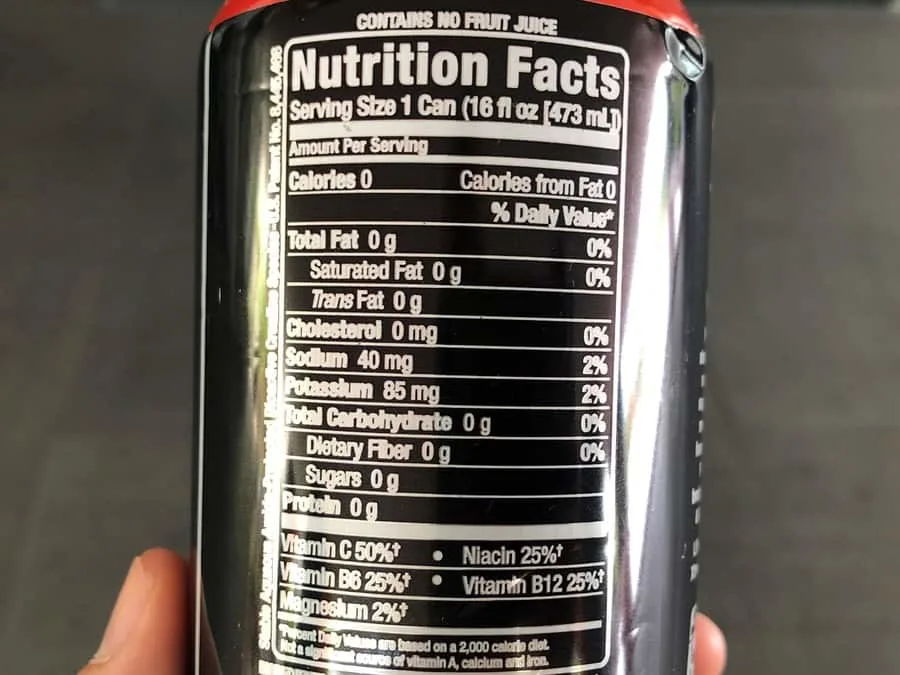
How Many Calories Are In Bang?
Bang is completely calorie-free, so it won’t have a substantial impact on your overall diet and appetite unless you aren’t compatible with the carbonation within Bang.
If there’s one thing Bang has over the more popular energy drinks on the market, being calorie-free might be it.
This aspect of Bang is especially appealing if you’re on a diet and don’t want to add any unnecessary calories before your meals.
With Bang, you’re able to keep your daily calorie intake in-check, giving you a little more leeway regarding the calorie content for your actual meals.
Just be aware that you’re not actually getting any ‘energy’ from Bang, as most of the boost you’re getting is due to the 300mg of caffeine, so your cells are technically running empty.
This is why it’s very important that you don’t treat energy drinks as substitutes for actual meals or have them on an empty stomach.
Even if you feel energized, your body doesn’t exactly really have enough calories to sustain your activity, and you’re likely going to come off the caffeine-high feeling rather sickly.
So the best thing to do is to complement your can of Bang with an actual healthy meal. That way, you’ll have just the right amount of calories you need to put that energy boost to good use.
Bang Energy Drink Ingredients
Have a look at the list of Bang Energy ingredients, all taken from the back of the can:
- Carbonated water
- Citric acid anhydrous
- Natural flavors
- Malic acid
- Caffeine
- Sodium benzoate
- Potassium citrate monohydrate
- Essential amino acids.
- Sucralose
- Potassium phosphate dibasic
- Vitamin C (ascorbic acid)
- Potassium sorbate (preserves freshness)
- Magnesium chloride
- SUPER CREATINE® (Creatyl-L-Leucine [Creatine bonded to L-Leucine])
- Calcium chloride
- Calcium disodium EDTA
- Vitamin B3 (niacinamide)
- CoQ10 (coenzyme Q10)
- Vitamin B6 (pyridoxine hydrochloride)
- Vitamin B12 (methylcobalamin)
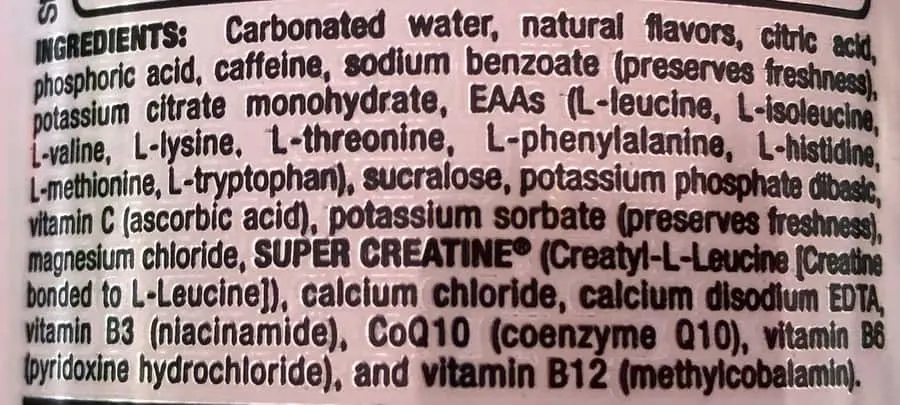
How Much Caffeine Is In Bang Energy?
Each 16 fl.oz can of Bang has 300mg of caffeine, which, according to the label on the back of the can, states that it’s equivalent to more than two regular cups of coffee.
Bang definitely has one of the higher, if not the highest, caffeine doses you can find in an off-the-shelf energy drink, with nearly twice the caffeine content of a Rockstar or Monster of the same volume (160mg and 179mg respectively per 16 fl.oz).
Now, just because Bang has a higher caffeine content, that doesn’t necessarily mean that you’re going to get a better energy drink experience from it, especially if you happen to be caffeine-sensitive.
Personally, as someone who usually likes the caffeine content in an energy drink to be somewhere around 100mg per serving, Bang is definitely an energy drink that I wouldn’t usually go for.
But, if you need to stay awake or you’re looking for an energy drink to give you a crazy boost for your high-intensity workout, then Bang might be exactly what you need.
Just don’t overdo it on the caffeine consumption, as the FDA recommends a maximum caffeine intake of 400mg per day. Having more than that, or more than what’s tolerable can lead to some notable side effects, including:
- Insomnia
- Shakiness
- Restlessness
- Stomachache
- Nausea
- Headaches
As with any caffeinated beverage, moderation is always key.
Try not to have more than one can of Bang in a day, and be sure not to double down on other caffeinated beverages, such as coffee, tea or sodas before or after having a Bang.
Does Bang Energy Contain Sugar?
Bang Energy drinks are entirely sugar-free, although it does have artificial sweeteners, namely Sucralose.
Generally speaking, energy drinks often pack a lot of sugar in them (a 16 fl.oz can of Monster has 56g of sugar), and since you’re only supposed to have 25g to 36g of sugar per day, they usually aren’t exactly the healthiest drinks to have.
However, with Bang being sugar-free, you don’t have to worry about adding any extra sugar into your diet, which gives you a bit more leeway with your daily sugar intake since you don’t need to factor in any sugar in the case of Bang, which is great.
You also get to avoid going through a sugar crash with Bang, as there isn’t anything present in the drink that would affect your blood sugar levels, causing rapid spikes or declines.
On the flipside, Bang does contain Sucralose, which is an artificial sweetener that’s around 200 to 700 times sweeter than regular sugar.
While there may be controversies surrounding artificial sweeteners, they are approved by the FDA, so you should be fine so long as you’re not consuming too many products that contain them.
How bad is Bang energy for your health?
Unless you already have a preexisting condition, drinking a can or two of Bang energy drinks won’t hurt you. However, 300mg of caffeine is a huge amount, and you should note that it may lead to pesky side effects such as nausea, vomiting, migraines, and muscle tremors if consumed in high batches.
In general, the effects of Bang energy drinks on one’s health vary from person to person. Some people may have no negative effects from drinking these drinks, whereas others may have negative consequences such as increased heart rate and blood pressure, insomnia, anxiety, and/or gastrointestinal issues.
Before drinking any energy drink, including Bang, individuals should consult with their healthcare provider to determine if it is appropriate for them.
Bang Energy Drink Side Effects
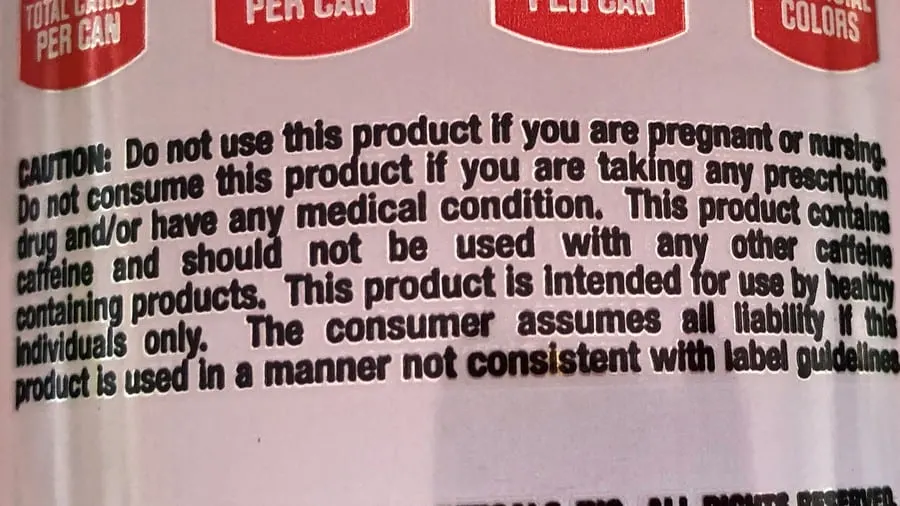
Due to the Bang’s exceptionally high caffeine content, you’re more likely to experience caffeine-related side effects if you’re not used to having a lot of caffeine or if you’ve already had more caffeine than you should have for the day.
If you happen to be inexperienced with energy drinks or caffeinated beverages in general, you should probably start with something lighter than Bang due to its particularly high caffeine content.
In my opinion, 300mg of caffeine in a single drink is completely unnecessary and excessive.
While the caffeine in Bang is technically well within FDA-approved daily caffeine intake limits, it’s still a heck of lot of caffeine for anyone to handle. As such, Bang probably isn’t really the best drink to have unless you’re looking for an intense boost.
On that note, even if you are a caffeine veteran, downing an entire can of Bang in one go is still ill-advised, as the sudden intake of 300mg of caffeine may be too much for you to handle.
Even if you haven’t finished the entire can, you should probably put it down if you start to experience any immediate caffeine-related side effects, such as shakiness, headaches, or an elevated heart rate.
Also, be aware that since caffeine keeps you awake, you may experience moderate insomnia, especially if your body hasn’t yet metabolized all of the caffeine before you go to bed.
Of course, all of these are worst-case scenarios; so long as you consume Bang’s in moderation you should be able to avoid most of the pitfalls when it comes to the risks of excessive caffeine consumption.
Are Bang Energy Drinks Bad For Your Heart?
Due to its massive caffeine content, Bang does increase your heart rate, possibly also leading to higher blood pressure. But, as long you’re healthy and have a balanced diet and no pre-existing medical conditions, you should be alright.
Scientifically, large doses of caffeine do lead to an increase in heart rate and blood pressure, but the effect isn’t usually too drastic unless you happen to have cardiovascular disease.
For most people, the cardiovascular effects of Bang should be pretty minimal, as stated by this scientific journal:
In healthy individuals aged 22 to 59 years who consume 200 to 300 mg of caffeine, indirect tests indicate improved ECF and vasodilation at rest. So adults consuming this much caffeine during activities of daily living are likely safe.
Caffeine in Food and Dietary Supplements: Examining Safety: Workshop Summary.
Of course, the situation is very different if you happen to be overly sensitive to caffeine, pregnant/nursing, or have a cardiovascular condition that might be made worse by caffeine, in which case you should avoid Bang and instead choose something with a lot less caffeine.
If you’re in any of these categories, Bang probably isn’t a wise choice.
Is Bang Bad for you Web Story.
Can Bang Energy Be Consumed on an Empty Stomach?
In general, consuming an energy drink on an empty stomach is not a good idea, and this holds true for all brands. You will end up feeling sick because there is nothing on your stomach to protect it in any small way.
Most energy drinks are safe for consumption on an empty stomach, and some may cause stomach aches or nausea. Hence, If you have any worries, consult your doctor before ingesting energy drinks.
Is Bang Better For You Than Monster?
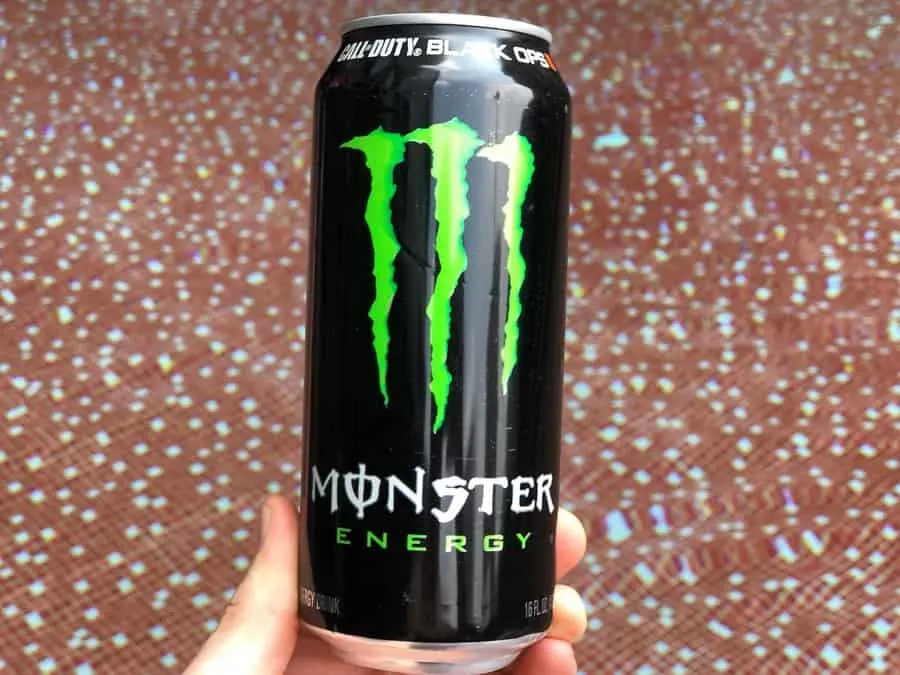
| Bang (16 fl.oz) | Monster (16 fl.oz) | |
| Calories | 0 calories | 210 calories |
| Sugar | 0g | 54g |
| Caffeine | 300mg | 179mg |
| Price Per Can | Around $2.50 | Around $2 |
While Monster is usually a bit cheaper and has considerably less caffeine, Bang’s sugar and calorie-free nature is pretty hard to argue with.
Although most of the comparison between Bang and Monster will boil down to personal preference, here are the bare essentials to understand regarding Bang vs. Monster:
- Bang has fewer calories than Monster (0 calories vs. 210 calories)
- Bang has less sugar than Monster (0g vs. 54g)
- Bang has a lot more caffeine than Monster (300mg vs. 179mg)
- Bang has a higher price than Monster (Around $2.50 vs. $2)
So, while Monster is less likely to give you a headache, its high sugar and calorie content does pose a bit of a risk for long-term impacts on your health.
With Bang, however, the high caffeine and price might be pretty intolerable for your health and your wallet.
Ultimately, it’s up to you and your personal preferences as to which energy drink suits you best, so make sure to keep these aspects in mind when selecting your energy drink of choice.
Are Bang Energy Drinks Actually Healthy?
While being healthier than your average energy drink, Bang isn’t exactly what most people would describe as healthy, even with all the vitamins and minerals in its mix.
While you can’t beat good old water as the healthiest beverage in existence, Bang does prove itself to be a cut above some of its peers due to being both sugar and calorie-free.
As for how it affects your health, it mostly depends on how you use Bang and whether or not you find the caffeine content manageable, because it’s certainly a lot of caffeine.
If you’re working out, having a Bang might help in improving your exercise performance, which makes Bang a good choice to complement your exercise routine.
In any case, so long as you’re always having Bang in moderation and know what you’re using it for, there’s definitely an argument to be made that Bang might be a healthy addition to your lifestyle.
And if you happen to have any doubts, it’s always best to consult a health specialist before adding any caffeinated beverage such as Bang to your diet.
For a more detailed look at whether energy drinks are bad for you, have a look at the video below, which goes into some depth on the topic:
Bang Energy Drink Flavors
Bang has a total of 24 wide and varied flavors. Here’s a few of them below to give you a sense of what they offer:
- Black Cherry Vanilla
- Blue Razz®
- Champagne
- Candy Apple Crisp
- Cherry Blade Lemonade
- Citrus Twist
- Cotton Candy
- Purple Haze
- Root Beer
- Radical Skadattle
- Rainbow Unicorn
- Sour Heads
- Star Blast®
- Birthday Cake Bash
- Miami Cola
Final Thoughts
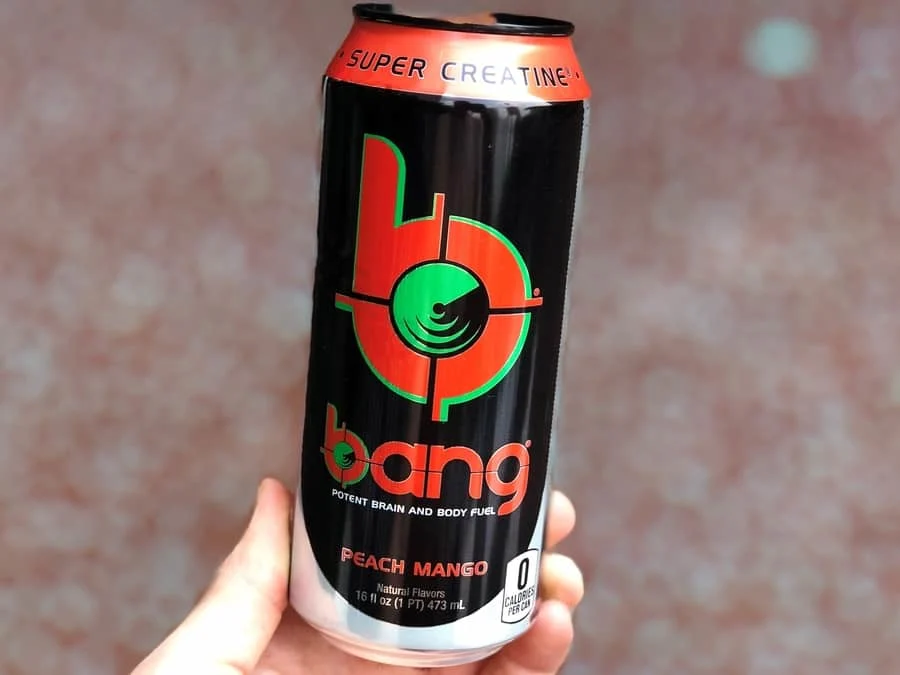
To conclude, so long as you’re a healthy individual without any pre-existing health issues, having a can of Bang shouldn’t be too detrimental to your health, so long as you find the caffeine levels tolerable, of course.
If you’re wondering how many Bang’s you can drink in a day, you’ve got to check out my other article where I cover absolutely everything you need to consider.
I hope you found this article helpful and informative, enjoy your day and your Bang!
View the visual story version of this article here.
Read More About Bang
- Does Bang Actually Work?
- Does Bang Contain Alcohol?
- Where To Buy Bang Online
- Bang Vs Red Bull (all the facts)
- When Does Bang Energy Kick In?
- Bang Energy Review (Honest Opinion)
